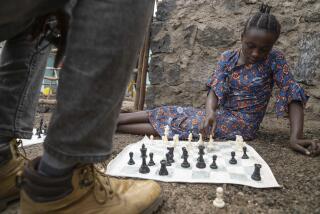Making Every Move Count--as in the Game of Life
- Share via
It began in 1998, as a way to stop unruly fourth-graders from fighting during lunch at 75th Street Elementary. Teacher Lilieth El bought a bunch of $3 chess sets, hauled a handful of kids into her classroom at noon and taught them a game she had loved since she was a child.
Within a few months the chess lessons had grown so popular that the South-Central Los Angeles school bought 10 more sets and launched a chess program, with El at the helm. “We had about 20 kids show up, and not one of them had ever played before,” she recalled.
Last year, more than 100 children turned out, after the club was mentioned at a school assembly. Principal Chris Stehr rounded up enough donated sets to give every child a chance to play, and the Tigers Chess Club was born.
They entered a few tournaments last year, but came home empty-handed. “The kids were a little intimidated,” Stehr said. Some didn’t win a single game.
But two weeks ago, the 75th Street team’s third- and fourth-graders walked off with 1st-place trophies from a scholastic chess tournament in Riverside. Each child played 15 games during the course of the day. It was the only inner-city school in the competition, and its kids tallied more wins than any other elementary team.
*
El, who became a certified chess coach so she could better teach the students, has big plans for her fledgling team.
“They are good and they are tough. But there is a lot about the game they have to learn.” She hopes to raise enough money to allow them to compete in a national tournament in Kansas City this spring.
Another teacher, Stacey Koff, volunteers with El to coach the team. Koff still considers herself a student of the game. “I’m about good enough to beat the kids, but that’s all,” she says. She got involved with the club after she began teaching chess to her first-graders.
“They weren’t getting the reading yet because of the language barrier,” Koff said. Spanish is the primary language of almost all of her students. “But I knew these were smart kids, so I started teaching them [chess] four at a time, during the 20 minutes of the day when we have free time.
“Some of them didn’t get it,” she says. “But the ones that did . . . I pushed them, because I knew they would feel successful if they could master this.”
Unlike El, who grew up playing chess in her native Jamaica, Koff didn’t learn the game until she was a young woman on a visit to Israel. “I was 21 and I thought, ‘Gosh, why didn’t somebody teach me this when I was a kid?’ I was a very math-minded person, but I was a terrible student.”
Chess, she says, “offers a different way of thinking and seeing things. . . . You have to strategize things, be able to question yourself and your opponent, look for different ways around problems. I’m not sure these kids think of life that way.”
By conventional measures, 75th Street is one of the Los Angeles Unified School District’s least successful schools. Test scores are low; student turnover is high. It draws its pupils from some of the city’s poorest neighborhoods. “A lot of my kids can’t come to practice because they have to attend remedial classes after school to try to bring our test scores up,” El says.
But the teachers have seen success at chess spill over into the classroom.
*
Fourth-grader Ismael Avina began learning the game two years ago. Two weeks ago, he walked off with an individual first-place trophy at the Riverside tourney, posting the most wins in his age group. Of the 15 games he played, he lost only one.
“I’ve known Ismael since kindergarten,” Koff says. “All his life, he’s never done well in school. He was retained one year, had problems learning to read. He’s clearly a smart kid, but he struggled. To watch him now take the patience, study that board, figure out a way to outsmart somebody . . . it’s incredible.”
*
Waves of club members congregate in a classroom-turned-storage room during lunch. They are hunched over chess boards, locked so deep in concentration, they barely acknowledge my questions.
Ismael is tutoring third-grader Celso Marin in the fine points of playing to win. “Look what he’s doing,” he warns Celso, as Anthony Reyna puts Celso in check. Anthony complains that Celso is cheating and summons El to mediate. “He took his hand off. You can’t move it after you take your hand off, right, Ms. El?”
El marches over and studies the board, admonishing Celso not for breaking a rule, but for failing to be as aggressive as he should: “You shouldn’t have your king so far back this late in the game. You should have developed it by now.” Her voice is no-nonsense. “Every move you make must be significant, must be moving you closer to your goal.”
Each round of moves brings another bit of advice from El. “Keep the attack up. Don’t let up. You want to keep your opponent worried. Make every move count for something.”
She knows the lessons apply to more than just moving pieces on a board.
“They’re learning math skills, reasoning skills, projection and planning. These are higher-order thinking skills, classroom skills. But they are also learning to protect their pieces, to fight clean, to respect your opponent, but let no one intimidate you. To never give up. These are life skills, the art of the game.”


